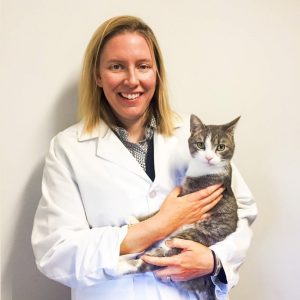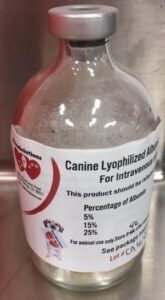-
Adopt
-
Veterinary Care
Services
Client Information
- What to Expect – Angell Boston
- Client Rights and Responsibilities
- Payments / Financial Assistance
- Pharmacy
- Client Policies
- Our Doctors
- Grief Support / Counseling
- Directions and Parking
- Helpful “How-to” Pet Care
Online Payments
Emergency: Boston
Emergency: Waltham
Poison Control Hotline
-
Programs & Resources
- Careers
-
Donate Now
 By Megan Whelan, DVM, DACVECC, CVA
By Megan Whelan, DVM, DACVECC, CVA
angell.org/emergency
emergency@angell.org
617-522-7282
 Canine-specific albumin (CSA) is a HemoSolutions product made by separating albumin from screened canine frozen plasma by a modified heat shock method.1 There are no additives or preservatives in the product. The lyophilized powder product is stable on the shelf for a year. It can be rehydrated with various amounts of sterile water to make specific percentages of albumin: 5%, 15%, 25%. The bottle should be gently swirled, and the total volume in milliliters in the bottle will depend on to which percentage you reconstituted it. We tend to reconstitute to 5% albumin, to avoid fluid overload and it can be given through a peripheral line. No in-line filter is needed. The product is good for 24 hours once reconstituted. It must be refrigerated at 40C if not used immediately. The suggested dose is 0.8 gram/kg. A slow infusion is recommended, at a rate of 1 ml/min. However, the rate of CSA infusion can vary based upon the product, but up to 6 hours is routinely reported.
Canine-specific albumin (CSA) is a HemoSolutions product made by separating albumin from screened canine frozen plasma by a modified heat shock method.1 There are no additives or preservatives in the product. The lyophilized powder product is stable on the shelf for a year. It can be rehydrated with various amounts of sterile water to make specific percentages of albumin: 5%, 15%, 25%. The bottle should be gently swirled, and the total volume in milliliters in the bottle will depend on to which percentage you reconstituted it. We tend to reconstitute to 5% albumin, to avoid fluid overload and it can be given through a peripheral line. No in-line filter is needed. The product is good for 24 hours once reconstituted. It must be refrigerated at 40C if not used immediately. The suggested dose is 0.8 gram/kg. A slow infusion is recommended, at a rate of 1 ml/min. However, the rate of CSA infusion can vary based upon the product, but up to 6 hours is routinely reported.
The main indication for CSA is to help with plasma volume in shock as well as in patients that have hypoproteinemia (such as in sepsis, trauma). Like any transfusion the temperature, pulse and respiration (TPR), and respiratory effort of the dog should be monitored throughout the administration time at 15 min, 30 min, 1, 2, 4 hours (if need be) and at the conclusion of the transfusion.
There was a safety study done in six healthy, purpose-bred Beagles that received three separate 1 g/kg doses of 16% CSA (HemoSolutions) over 2 hours, on day 1, 2, and 14.2 No immediate nor delayed adverse effects were seen and the dose of CSA was effective in increasing the COP and serum albumin.2 This product has not been tested in young or pregnant animals.1 Due to the rapid increase in plasma volume dogs should be monitored for signs of hypertension, pulmonary edema, dropping packed cell volume (PCV) and bleeding.1
In the veterinary literature there is one prospective, randomized, clinical trial of 14 dogs which had septic peritonitis and received lyophilized CSA from Animal Blood Resources International.3 In this study there were no delayed adverse events. The group that received canine albumin had an increase in albumin, colloid oncotic pressure, and doppler blood pressure 2 hours after administration compared to the control group. The increased albumin persisted for 24 hours.3
 The main concern with giving a non-canine product, like human albumin, to a dog is not only an acute reaction but the delayed, Type III hypersensitivity reaction that have been well documented in the veterinary literature.4 The goal with the administration of any albumin product is not to achieve a normal albumin level but to improve the albumin serum level.
The main concern with giving a non-canine product, like human albumin, to a dog is not only an acute reaction but the delayed, Type III hypersensitivity reaction that have been well documented in the veterinary literature.4 The goal with the administration of any albumin product is not to achieve a normal albumin level but to improve the albumin serum level.
There are multiple companies that make canine-specific albumin (CSA) including HemoSolutions (info@hemosolutions.com) and Animal Blood Resources International (www.ABRINT.net or 1-800-243-5759), but both come in 5 gram vials. A 5 gram vial of canine lyophilized albumin costs $225.00 at our hospital. When administering canine albumin intravenously one should read the particular product’s insert since some require sterile water, whereas other products specifically say do not use sterile water but instead 0.9% NaCl. In general, more studies need to be conducted on the administration of CSA to establish more conclusive guidelines and recommendations.
- HemoSolutions instructions which are wrapped around each bottle or https://www.hemosolutions.com/wp-content/uploads/2018/10/FINAL-Albumin-product-insert.pdf
- Enders et al. Repeated infusion of lyophilized canine albumin safely and effectively increases serum albumin and colloid oncotic pressure in healthy dogs. IVECCS Abstract 2018, S5.
- Craft et al. The use of canine-specific albumin in dogs with septic peritonitis. J Vet Emerg Crit Care 2012;22(6): 631-639.
- Powell et al. Type III hypersensitivity reaction with immune complex deposition in 2 critically ill dogs administered human serum albumin. J Vet Emerg Crit Care 2013;23(6): 631-639.